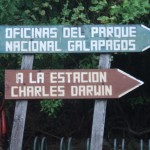 Source: Charles Darwin Foundation Press Release.
Source: Charles Darwin Foundation Press Release.
Dr. Francisca Massardo, coordinator of the Universidad de Magallanes in Puerto Williams, was recently invited to participate in an international workshop on “Island Cultures and Sustainable Lifestyles,” hosted from 28-30 September at the Charles Darwin Biological Station, Galapagos Islands, Ecuador.
The event brought together international experts from islands of the South Pacific, New Zealand, Easter Island, Fiji, the Orkneys and Galápagos, and Chile, who together with members of local and national institutions, NGOs, and invited guests, exchanged experiences on the themes of island societies and environments.
To inaugurate the workshop, CDF Executive Director Dr. J. Gabriel López underlined the importance of this event: “This is the second in our series of workshops on Island Sustainability. Rather than identify only problems, CDF and our partners are focused on devising sustainable solutions and we wish to draw on experiences from throughout the world that can be applied to Galápagos. This is part of a fresh approach to broadening the conservation agenda by involving Galápagos communities and other stakeholders in an integrated effort to design an archipelago-wide sustainable development model that can serve as a guide for decision making and as an example for the world.”
Felipe Cruz, CDF Director of Technical Assistance, stated that: “The workshop will deepen understanding of the different realities lived in various archipelagos on Earth, but above all, here in Galápagos because of their international fame and unique biodiversity that bring nature and people together.”
Among the principal themes for discussion were:
1. Local production vs. imported goods and services;
2. Consumption patterns and daily life;
3. Human mobility.
This is CDF’s second international “Island Sustainability” workshop among a series programmed for 2010-2011 covering topics such as tourism, energy and transport, water and waste management, and climate change, among others, all linked to island conservation and sustainable development.
OSARA Journal
Communicating research, education and conservation efforts in southern Patagonia
